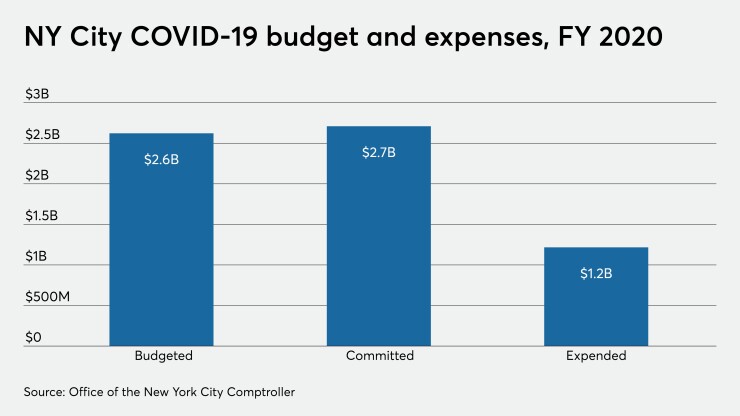After New York Mayor Bill de Blasio and City Council leaders agreed on an $88.19 billion budget as the midnight fiscal 2021 deadline neared, the council approved the plan by a 32-17 vote at 12:33 a.m. Wednesday.
"It's been a challenging but very productive process," the mayor told reporters during the day Tuesday.
De Blasio said the plan closes an estimated $9 billion revenue gap due to the economic shutdown from COVID-19 through "deep cuts to city agencies," and pares nearly $1 billion from New York Police Department operational and capital funding through cuts and transfers.
Those moves include the shift of school safety officers to the Department of Education, canceling the July police recruiting class, "major" overtime reductions and a drop in contracts and other non-personnel expenses.
In addition, de Blasio cited $1 billion in overall labor savings, saying discussions with unions are ongoing. The city has a hiring freeze in effect but plans no layoffs for now, though the mayor said it could be an option in October if the federal and state governments remain stalled over further coronavirus aid.
While the mayor is cutting $430 million from the police operating budget, he also announced a diversion of $537 million in capital funds from police to youth recreation centers and employment programs, and the New York City Housing Authority.
The police adjustment amounts to about one-sixth of that department's budget. City Council Speaker Corey Johnson and others in the council's progressive wing had called for such reductions after a wave of protests that followed the death of George Floyd at the hand of the police in Minneapolis.

Critics, including some council members, called the cost shifts "sleight of hand" moves that aren't really cuts. Others have questioned whether the city can sharply reduce police overtime during a spike in crime. In addition to the protests, some of which included looting, murders and shootings in New York are tracking well above 2019 numbers, as are complaints citywide about illegal fireworks.
Police Tuesday morning clashed again with protesters who have encamped at City Hall Park for about a week. Thousands were outside City Hall while the council took its late-night virtual vote.
The $88.1 billion total exceeds by $1 billion what de Blasio cited last week and is about $5 billion larger than last year's approved plan. He released a $95.3 billion preliminary budget in January, before the pandemic escalated, and whittled it to $89.3 billion in his executive budget in April.
De Blasio reiterated his frustration over lack of help from Washington and Albany.
The $3 trillion HEROES bill, the latest federal rescue package, is stalled in the U.S. Senate. In Albany, the state Senate is holding up a bill enabling the city to borrow up to $7 billion for operating purposes.
"At some point, if Washington doesn't act, if Albany doesn't act, then we end up in a very tough situation," de Blasio said.
"The Assembly and the Senate gave borrowing authority to the City of New York after 9/11 with basically no strings attached, no debate, they just knew it was the right thing to do. Since they haven't done it, we now have to go ahead in this budget and put in a billion dollars of labor savings."
New York State has already allowed extra borrowing authority for the Metropolitan Transportation Authority, Nassau County and itself.
De Blasio cited the city's strong standing on Wall Street.
The city used the 2001 authority " judiciously, carefully [and it] helped us come back from 9/11," de Blasio added. "The New York City bond ratings went up in the last 12 months, for God's sakes. This is not the 1970s."
Actually, the last positive rating action came March 1, 2019, when Moody's Investors Service upgraded its general obligation bonds to Aa1 from Aa2. Moody's three months ago lowered its outlook on city GOs to negative. S&P Global Ratings and Fitch Ratings rate city GOs AA, both with stable outlooks.
Frequent borrowing to cover operating expenses nearly pushed the city to file for bankruptcy in 1975.
The police budget cut comes at a delicate time for the mayor, who, like many local leaders nationwide, is trying to weigh protest demands to downsize the police department against public safety concerns.
In Los Angeles, for instance, Mayor Eric Garcetti's proposed budget calls for slashing about $145 million for local police, including special victims and major crimes bureaus.

The city employs roughly 325,000 workers. De Blasio has added 30,000 municipal employees since taking office on Jan. 1, 2014.
"Many, including ourselves, have regularly cited rapidly expanding headcount as a credit risk as the growth in headcount could not be sustained in other than an optimal economic environment," municipal bond analyst Joseph Krist said.
Update: The story was updated with City Council approval of the budget.





